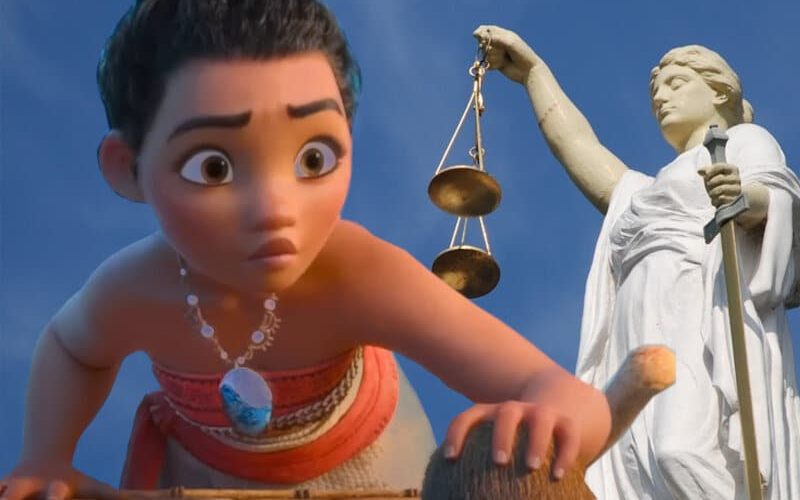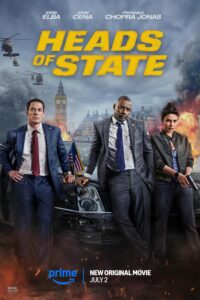Disney has been embroiled in a lawsuit related to Moana 2, the highly-anticipated sequel to the 2016 animated blockbuster. Released in 2024, the sequel follows the returning, Moana, who assembles a crew for a new oceanic adventure, which reunites her with the charismatic demigod, Maui. Generating $964 million worldwide, the animated film became the fourth highest-grossing film in 2024. Given its accomplishments, how will this lawsuit impact the future of the beloved franchise?
Moana 2 Copyright Infringement Lawsuit
While Moana 2 has broken box office records, it has also become a strong contender this award season. Specifically, the film is highly favored to win in both categories for Best Animated Feature and Best Original Song. Although the sequel lost to Flow, its Golden Globe nomination for Best Animated Feature proves its excellence. Furthermore, the song, Beyond, found success as it was shortlisted for an Academy Award nomination.
Following its delay due to the ongoing Los Angeles wildfires, the official nominations for the Academy Awards will be announced on January 19. Despite the delay, fans’ anticipation and excitement surrounding the awards has only increased. The success of Moana 2 is attributed to its captivating storyline, memorable characters, and catchy musical numbers. Grossing over $911 million worldwide, these factors also contributed to its massive commercial success.
With Disney facing a copyright infringement lawsuit over Moana 2, it marks the latest intellectual property dispute involving the entertainment giant. Unfortunately, this isn’t an isolated incident for the company as it’s navigated similar lawsuits previously. For example, the MOVA Contour motion-capture software used to bring the Beast to life in the 2017 live-action adaptation, Beauty and the Beast, was involved in a recent case.
Disney’s History of Intellectual Property Disputes
Disney was fined $600,000 but the ruling was later overturned due to the contractor being held responsible. Specifically, it was determined that the contractor had acted without the company’s knowledge, thus making him liable for the misuse. In another case, Arthur Lee Alfred II and Ezequiel Martinez Jr. sued the entertainment giant in 2017. According to both men, the company’s Pirates of the Caribbean franchise was allegedly based on their 2000 screenplay. These cases demonstrate that Disney isn’t immune to intellectual property disputes, but will remain vigilant in protecting its creative assets.
In 2019, Disney’s motion to dismiss the Pirates of the Caribbean claims was granted. Notably, the court’s decision was determined that the similarities discovered between the plaintiffs’ submitted screenplay and the 2003 film weren’t sufficient. Precisely, the tropes they share are common in the pirate genre, which isn’t protected under copyright law. While the plaintiffs had lost, they weren’t deterred. Subsequently, they filed an amended complaint, reviving their claims against the media juggernaut. Once again continuing the legal battle, they sought to persuade the court of the company’s unfair use of their work.
Buck Woodall’s Copyright Infringement Lawsuit
Animator Buck Woodall filed a $10 billion lawsuit against Disney, alleging the Moana films infringe on his copyrighted screenplay for his movie, Bucky. The lawsuit states that Woodall submitted his screenplay, a concept trailer, and other materials to Mandeville Films’ Director of Development, Jenny Marchick, in 2003. At the time, Mandeville Films formed a working relationship with Disney in a first-look deal. According to the lawsuit, several key elements from the animator’s Bucky screenplay appear in the Moana films, including:
- An ancient Polynesian village setting
- A teenager’s ocean adventure featuring ancestral spirits manifesting as animals
- A turtle triggering the adventure
- A symbolic necklace playing a crucial role in the story
- A demigod character wielding a hook and sporting tattoos
- A large creature hidden within a mountain
- A whirlpool portal sucking in the crew
Due to these similarities, Woodall seeks damages nearly 2.5% of Moana’s gross revenue. Furthermore, the lawsuit highlights alleged similarities between Bucky and Moana 2, particularly regarding the protagonist’s quests. Specifically, both works show the main character embarking on a mission to find an ancient island and break a curse.
The Similarities Between Bucky and Moana 2
A striking overlap in the depiction of a dangerous oceanic portal is pointed out in the lawsuit. In Moana 2, the main character and her crew are sucked into a whirlpool portal that resembles a similar device found in Woodall’s materials. This alleged coincidence raises questions about the possibility of chance or intentional borrowing. However, the lawsuit suggests that the similarities may prove more sinister intentions.
Woodall’s current lawsuit against Disney isn’t his first attempt to seek readdress. Originally, he filed a lawsuit against the original Moana film, although it was dismissed in November. Notably, this lawsuit was dropped due to its late filing outside the statute of limitations. While the initial lawsuit was rejected, U.S. District Judge Marshall acknowledged the genuine factual disputes regarding the similarities between the animator’s work and the 2016 film.
Responding to the initial lawsuit, the co-director of Moana, Ron Clements, stated he didn’t know Woodall or his Bucky project before the current lawsuit was filed. Indeed, he maintained that the original film wasn’t inspired by or based on the animator’s work. Despite this response, Woodall persists with his claims and new lawsuit targeting Moana 2.
Moana Lawsuit Leads to Financial Consequences
The dispute regarding Moana 2’s storyline may be lengthy, potentially taking years to resolve. Despite the possible $10 billion payout, Disney’s finances wouldn’t take a significant hit due to the film’s massive commercial success. However, if Woodall wins the case, the future of the animated franchise may have far-reaching consequences. As a result, the company might opt to make the animator an executive producer. Ultimately, allowing him to share in the success of future installments potentially provides a mutually beneficial solution to the dispute.








